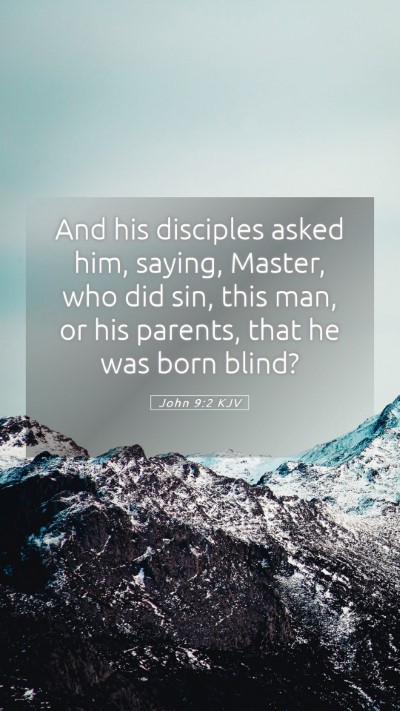Bible Verse Meaning: John 9:2
John 9:2 states, “And his disciples asked him, saying, Master, who did sin, this man, or his parents, that he was born blind?” This verse invites a profound analysis of suffering, sin, and divine purpose, shedding light on the disciples' understanding of affliction and the teachings of Jesus.
Summary of Insights from Public Domain Commentaries
-
Matthew Henry's Commentary
Matthew Henry discusses the tendency of the disciples to associate physical suffering with sin, which reflects a common belief in their time. He notes that the question reveals a misunderstanding of divine justice and the nature of suffering. Jesus, in response, redirects their focus from blame to the purpose of God’s work being manifested through the man’s condition.
-
Albert Barnes' Notes
Albert Barnes emphasizes that the inquiry posed by the disciples shows their limited understanding of theological implications of suffering. He mentions that they fell into a trap of legalism, seeking to identify the cause of sin rather than witnessing the miracle of healing. Barnes suggests that this passage encourages believers to seek the greater works of God rather than fixating on blame.
-
Adam Clarke's Commentary
Adam Clarke points out the implications of the disciples' question—highlighting how societal views may misinterpret divine judgment. He explains that the Jewish belief that physical afflictions were a direct result of sin led to a theological crisis. Clarke further clarifies that Jesus turns the conversation from guilt to glory, showing that not all suffering is a direct consequence of personal sin.
Theological Implications
The interplay of sin, suffering, and divine purpose is crucial for understanding this verse. The theological implications suggest that not every misfortune can be traced back to a personal or familial sin, which lays the groundwork for understanding God’s overarching plan and His grace. Jesus’ teachings invite believers to embrace their circumstances as part of a larger narrative of God’s relationship with humanity, where suffering can lead to revelation and healing.
Practical Applications
For today’s believers, John 9:2 serves as a guide for approaching suffering and hardship. It beckons us to:
- Consider the impact of suffering on our spiritual growth.
- Look beyond the immediate circumstances to seek God’s purpose.
- Engage in prayer and support for those enduring hardship rather than seeking to assign blame.
- Find hope in the assurance of Jesus’ transformative power through adversity.
Related Cross References
- John 9:1 - Jesus healing the blind man, setting the stage for the theological discussion on sin and suffering.
- Luke 13:1-5 - Jesus addresses the question of suffering and sin, emphasizing the need for repentance.
- 1 Peter 2:21 - Suffering as part of following Christ, linking personal afflictions with a greater purpose.
Conclusion
In conclusion, John 9:2 provides rich content for Bible verse meanings and Bible verse interpretations. By examining the insights from noted theologians, we gather an understanding that encompasses Bible study insights that can be applied to our lives today. This verse moves beyond the superficial inquiry of sin to reveal a profound teaching about God’s grace and the transformative potential of faith amidst suffering.
Further Study Opportunities
For those interested in exploring these themes further, consider engaging in Bible study groups or utilizing various Bible study tools. Resources such as Bible study guides and Bible study lessons can enhance your understanding of difficult passages and the broader context of scripture.


